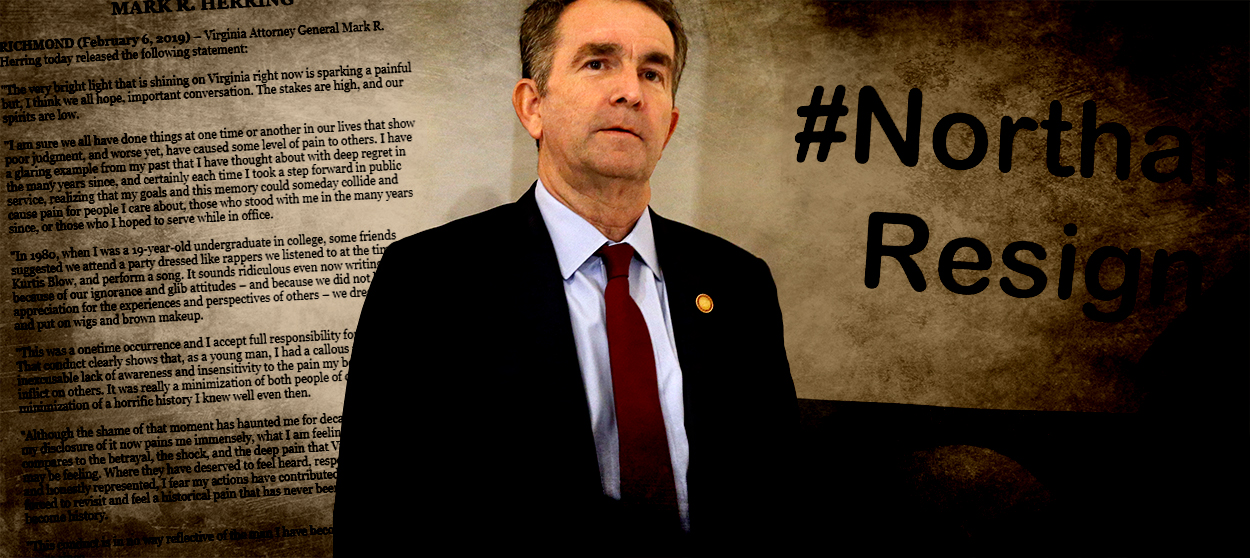Virginia's blackface scandals prove the Democratic Party needs younger leadership
The problem within the Democratic Party isn't just racial — it's generational


A free daily email with the biggest news stories of the day – and the best features from TheWeek.com
You are now subscribed
Your newsletter sign-up was successful
The leadership of the Democratic Party needs to start getting younger, and in a hurry.
That's probably one big lesson from the scandals brewing in Virginia, where both the Democratic governor and attorney general have brought their party — and state governance — to its knees by acknowledging, separately, that they wore blackface at public events during the 1980s. Add the continuing scandals about Sen. Elizabeth Warren's (D-Mass.) longtime claims of Native American ancestry, and the Democratic Party suddenly appears to have problems with racism heading into the 2020 presidential election. That's not great.
In the short term, Democrats may simply have to take a beating: It seems increasingly likely, for example, that they could lose the Virginia governor's seat to Republicans over this scandal. But they can best move forward from the present crisis if they realize that the problem isn't just racial — it's generational.
The Week
Escape your echo chamber. Get the facts behind the news, plus analysis from multiple perspectives.

Sign up for The Week's Free Newsletters
From our morning news briefing to a weekly Good News Newsletter, get the best of The Week delivered directly to your inbox.
From our morning news briefing to a weekly Good News Newsletter, get the best of The Week delivered directly to your inbox.
Virginia Gov. Ralph Northam is 59. Mark Herring, the state's attorney general, is 57. Warren is 69. Each might well be committed to civil rights and racial diversity — despite their present problems — but it's also the case that each was born into an America where white supremacy was the law of the land: The Civil Rights Act was passed in 1964, the Voting Rights Act was passed in 1965, and the Supreme Court overturned state bans on interracial marriage with its 1967 ruling in Loving vs. Virginia. That may say something about the clueless mindset on display in these recent scandals.
Of course, younger people can do dumb, racist stuff, too.
Michael Ertel, the Republican former Florida secretary of state who resigned over the emergence of blackface photos last month, is a relatively spry 49. Studies show that younger people may be less prone to use racial stereotypes, but they also suggest those younger people have simply found new ways to express prejudice. Every Halloween seems to bring a fresh round of appalling blackface photographs from America's college campuses, along with attendant controversies. The University of Oklahoma last month saw demands for the resignation of its president because of a video showing a former student in blackface. Young people usually are not morally superior to their elders.
Still, I would argue that the blackface scandals suggest it's time to let a younger generation claim leadership in the Democratic Party. My reasoning is simple: Millennials don't just think diversity is a good idea — they actually are more diverse as a group. And that fact is already making a difference in what the next generation of leadership looks like within the Democratic Party.
A free daily email with the biggest news stories of the day – and the best features from TheWeek.com
New York Congresswoman Alexandria Ocasio-Cortez has become the face of the freshman class of House Democrats. Stacey Abrams may have lost her bid to become governor of Georgia, but on Tuesday she delivered the official Democratic response to President Trump's State of the Union address — and gave one of the best-received performances in recent memory. There are three African Americans in the Senate, and two of them — Kamala Harris (Calif.) and Cory Booker (N.J.) — are Democrats. Both are running for president. And I would venture to guess there probably aren't many college yearbooks featuring any of those politicians dressed up in racist costumes.
The energy in the Democratic Party is already among women and people of color: The new generation of House Democrats is the most diverse cohort ever to hit Congress, and, not coincidentally, it's also pretty young — the average age of a House member in 2019 is nearly a decade younger than the group that took office in 2017.
But if the party is getting younger, the senior leadership is, well, still pretty senior. Among Democratic governors, for example, just three are under the age of 50. There are rumblings, however: House Speaker Nancy Pelosi (Calif.), 78, and her top lieutenant, House Majority Leader Steny Hoyer (Md.), 79, faced opposition in their leadership races from younger members of Congress ready to see fresh leadership.
Youth isn't everything, of course. Pelosi has proved a canny opponent to Trump. And putting forth a younger and more diverse set of faces won't head off every political scandal — the sexual assault allegations against Justin Fairfax, the 39-year-old lieutenant governor of Virginia, proves that. What's more, the suggestion is likely to be derided in some quarters as mere "identity politics."
What the Virginia scandals have revealed, though, is that mishandling identity issues can break the Democratic Party. Instead, the party should put these identity issues to work in a positive fashion. Democrats are getting younger and more diverse. The leadership of the party should reflect that — and so should the candidates the party supports for office.
Joel Mathis is a writer with 30 years of newspaper and online journalism experience. His work also regularly appears in National Geographic and The Kansas City Star. His awards include best online commentary at the Online News Association and (twice) at the City and Regional Magazine Association.
